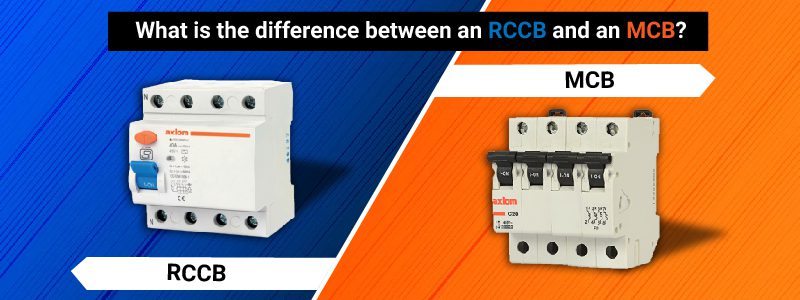
Miniature Circuit Breaker is referred to as MCB. It is an electrical switching mechanism to guard against overloads and short circuits in electrical devices and equipment systems. As a crucial element of the electrical distribution system, MCBs are often implemented in residential, commercial, and industrial systems.
What is the difference between an RCCB and an MCB?
An MCB (Miniature Circuit Breaker) and an RCCB (Residual Current Circuit Breaker) are separate types of electrical equipment with different electrical system functions. Although both are essential for assuring safety, their operation & the kinds of electrical defects they guard against differ.
The primary purpose of an MCB is to guard against overloads & short circuits in electrical circuits. It performs the switch function that automatically interrupts the power flow when it notices an excessive current or a circuit problem. Doing so reduces the possibility of fire threats by extreme heat, preventing damage to the wiring and electrical devices. Circuit breakers are often used in home, commercial, and industrial applications to protect from electrical systems. MCB manufacturers adhere to stringent quality control measures to ensure that their products meet the required safety standards.
RCCBs, on the other hand, concentrate on ground faults and electrical leakage protection. It recognises and reacts to an electrical current imbalance between the live and neutral wires. The live and neutral cables typically have equal currents flowing through them. However, the RCCB detects the difference in current and trips, immediately shutting off the power supply when leakage is caused by a malfunction or contact with an external source, such as a person or water. RCCBs are essential for personal safety because of their quick response in preventing electric shocks and possibly electrocution.
In contrast to MCBs, primarily concerned with detecting overcurrent and short circuits, Residual Current Circuit Breakers are created to detect residual currents, thus its name. They generally detect leakages of a few milliamperes to a few hundred milliamperes but are more sensitive to leaks of much smaller currents. Even though the present might not be high enough to trip a circuit breaker, this sensitivity safeguards RCCBs against electrical shocks. MCB manufacturers play a critical role in producing reliable and safe electrical devices for circuit protection, ensuring the smooth operation of electrical systems and preventing potential hazards.
Why are a Residual Current Circuit Breaker and a Miniature Circuit Breaker required in an electrical system?
It’s crucial to remember that RCCBs and MCBs frequently collaborate to offer complete safety for electrical systems. Miniature Circuit breakers defend against overloads and short circuits, but RCCBs augment that protection by providing better defence against electrical leaks and ground faults. Combining these components raises a building or system’s overall electrical safety.
In conclusion, the principal purposes and the kinds of electrical failures that a Residual Current Circuit Breaker & a Miniature circuit breaker guard against differ. Both tools are often utilised in residential, commercial, and industrial applications and serve critical roles in guaranteeing the security of electrical systems.
An MCB manufacturer specialises in designing, producing, and supplying Miniature Circuit Breakers (MCBs) for electrical distribution systems. MCBs are crucial components that protect electrical circuits and equipment from damage caused by overloads and short circuits.










